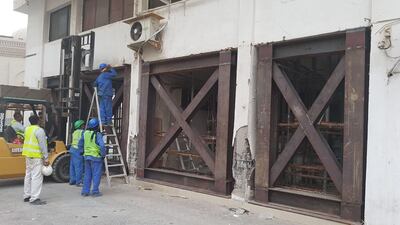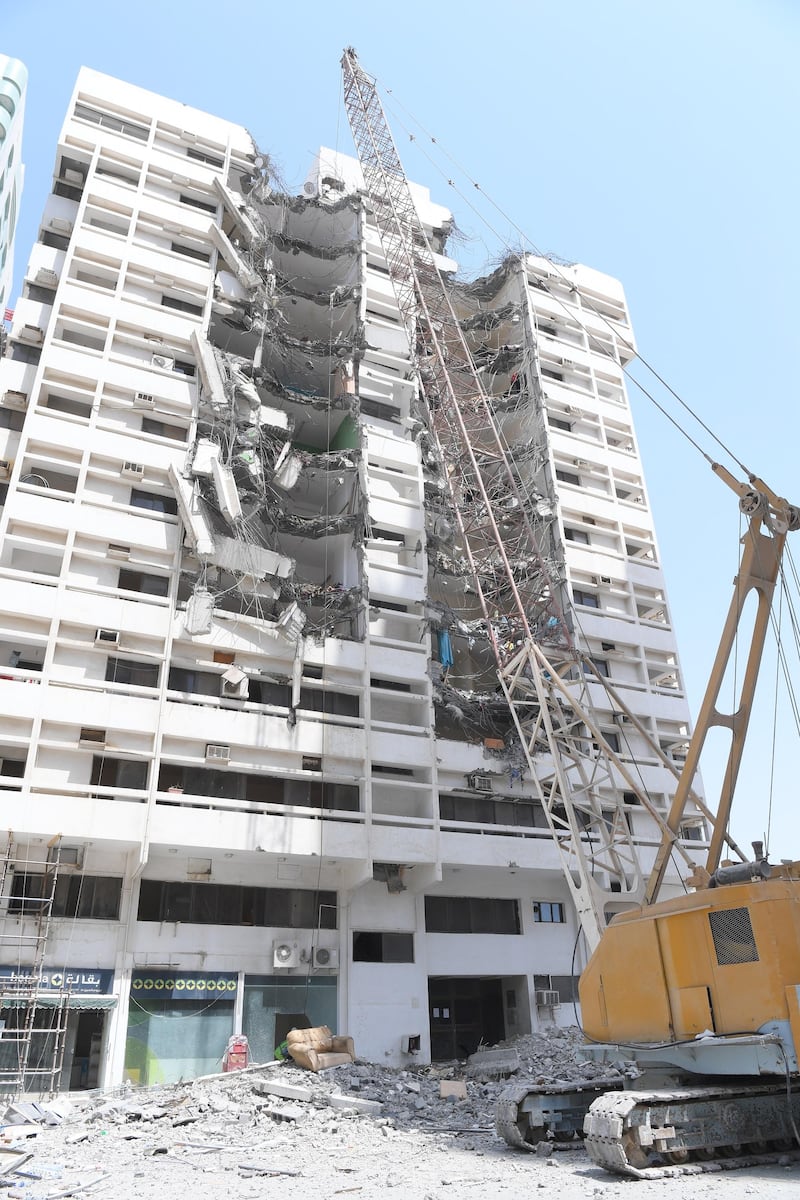An emergency evacuation of two Abu Dhabi tower blocks on the same day has prompted calls for greater clarity of tenants’ rights.
More than 400 residents of the two high-rises were ordered to leave their homes after reports of vibrations in one of the buildings last month.
Many of those forced to leave were housed in temporary accommodation for up to 20 days, as authorities ruled that one of the towers was unsafe and should be demolished.
Emirates Red Crescent, civil defence, the building manager and Abu Dhabi Municipality provided temporary accommodation for residents, but many others left without being given assistance.
“Tenants have rights but it can be unclear what happens if an evacuation is necessary,” said Khalfan Al Remeithi, Abu Dhabi branch manager of Emirates Red Crescent.
“This will be a growing issue as buildings in Abu Dhabi age. We’re afraid of more cases like this. Building owners must follow up on maintenance. I think when some of them see a problem they don’t want the headaches.”
The evacuations occurred on August 11 in Al Zahiyah. A nearby mosque was also emptied because of concerns the high-rises might collapse on top of it.

Families and tenants were sent to hotels across the city, paid for initially by Emirates Red Crescent. Since then, officials have made the decision to demolish the smaller 13-storey tower while allowing residents back into the second, 19-storey building, after declaring it safe.
Mohammed Hamsa, 62, and his son Mubeen, 25, from Kerala, India, described having to evacuate their block – now partly demolished – at short notice.
They had one month left on their rental contract, and the building's management company has agreed to repay the money and help them to find alternative accommodation.
“We were told to leave quickly and we took our passports, clothes and whatever else we could,” Mubeen said. “Some people were crying in the street. It felt very bad and very sad.”
Nearby hotels including the Cristal Hotel, Executive Suites and Al Diar Hotels took in many of those forced to abandon their homes.
The Cristal took in 100 people, filling 48 rooms.
“Some came without wallets and IDs and some families had four or five children,” said Antony Tadros, the hotel’s business development manager.
“It was handled with care because many were scared and they’d left in a rush.”
Issam Kassem, the building’s manager, said he had to shelve plans to travel for Eid to deal with the crisis. “I had to call 78 families personally,” he said. “It was difficult.”
Despite many of the residents of the two blocks being well looked after, there are fears others were not so lucky. Some of those living in the now partly-demolished block are understood to have been single men who paid their rent monthly, and who have since moved on without trace.
Whether they sought or were offered any form of compensation for the sudden loss of their homes is unclear.
_____________
Read more:
Abu Dhabi demolishes 220 health hazard buildings
How Mussaffah is undergoing a quiet transformation
'Every one of us is a little lost': Demolition starts on Umm Al Quwain's decrepit old town
_____________
On Sunday, Jonathan Rawling, chief financial officer of insurance comparison site YallaCompare, called for greater clarity in law in respect of the rights of tenants.
He said many landlords failed to take out cover to protect themselves against a scenario where a building might have to be demolished, and he urged tenants to consider buying policies.
Additionally, he said landlords should not be able to argue that the demolition of a building due to degradation was outside their control and that they were therefore under no obligation to compensate tenants.
“If it was an earthquake, maybe,” he said. “But if it’s something that’s happened through the deterioration of the building then I don’t see how you could make a case to avoid it.
“A survey that we conducted in April suggested that only 11 per cent of people in the UAE have home contents cover.
“It’s nice to say the landlord should give it [rent paid in advance by the tenant] back and if it’s a corporation with 1,000 apartments then maybe they have ready cash.
“But if you are renting from an individual it could be hard. You’ll get it eventually but you are in a hold for a few months.”
In recent months, municipality chiefs across Abu Dhabi have ramped up their efforts to target property owners who do not maintain the appearance of their buildings.
Proprietors have been given until the end of the year to comply with uncompromising rules on “preventive maintenance”, which include ensuring a building’s appearance is well maintained and continues to meet strict safety regulations.
Over the past three years, 376 buildings across the UAE have been served with offence notices having fallen short of building laws.






